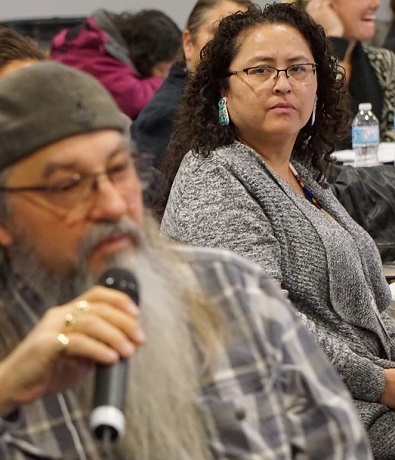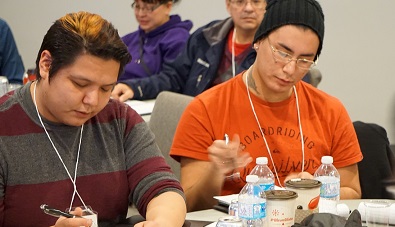People from First Nations all over Saskatchewan spoke on the microphone at the medicine gathering. Photo by Chelsea Laskowski.
Hundreds of First Nations people from across Saskatchewan feel they’ve gained momentum and inspiration to heal their communities from suicide.
The educators, young adults, and health workers were in attendance at this week’s Medicine Gathering, which was created by Prince Albert Grand Council and FSIN in response to youth suicides in northern Saskatchewan.
Suicide rates have long been an issue for reserves across the province.
Ronald Waditaka works with the Brighter Futures program on Wahpeton Dakota Nation, and said there have been four or five incidents of self harm in the past few months.
“This forum here that we’re having right now is the exact thing that we need,” he said.
Co-emcee Clifford Ballantyne from Sturgeon Lake is researching to help youth access mental health services through the Access Open Minds program, and says dealing with suicidal behavior takes a lot of heart.
“In these last four days, I had a friend that basically was giving me his last call,” he said.
“He hung up so I went to his place. It was so hard to see him in that state because I’ve been in that state that he’s in. And it makes the work that I do so much more important to address what’s going on in these communities, and it drives me.”
Ballantyne said he sat with his friend for five hours until he was in a better state of mind.
This week’s medicine gathering was guided by psychologist Darien Thiera, who has consulted with First Nations communities for decades.
Thira’s message, that colonialism has stripped First Nations of healthy lives and healthy communities, resonated strongly with Waditaka.
“As a residential [school] survivor, instead of it helping me out, it turned me away. I spent a lot of time in jails,” Waditaka said.
When Thira was on stage, he told people they already have the tools to heal their communities. Thira said it’s important to get young people involved and invested.
Luke Daniels and Malachi McAdam. Photo by Chelsea Laskowski
For example, he asked the audience to group together and come up with programs that has helped people in their community. The suggestions included a program to learn how to hunt and how to follow hunter’s protocol, and a program for youths to rebuild a community centre that had been vandalized by youths.
Stephanie Constant from James Smith Cree Nation says Thira’s suggestions about weaving culture into young people’s lives had a big impact on her.
“I’m real inspired by it. We definitely want to get ahold of him to come to our youth conference in the new year to see if he’ll come teach some of the kids there, the youth,” she said.
Constant is a band councillor and came to the gathering with a number of youths between the ages of 15 and 18 from the community.
Malachi McAdam from Sturgeon Lake said he, too, was inspired.
“Darien gave us hope, like gave everybody in the room hope, that we have the hope in our communities to help ourselves. That really struck a chord with me, I almost started crying. It was really powerful,” he said.
With the gathering now over, First Nations people across the province are planning cultural events to get their communities healthy and engaged. Waditaka acknowledged it could take years to turn around negative trends with young people, but said the most important thing is to communicate with youths in a real way.
Emcee Darrell McCallum said he wants to see the group reconvene in May to discuss the initiatives they’ve started.

